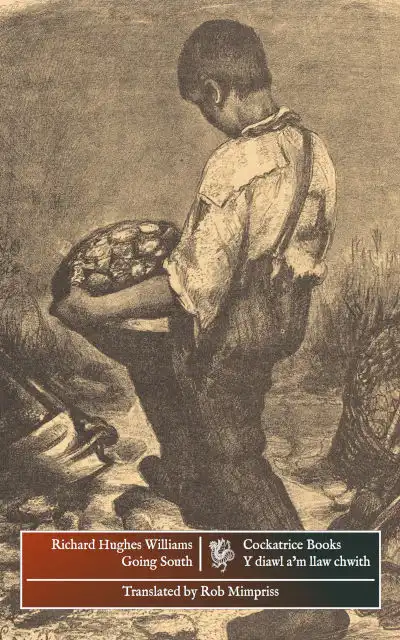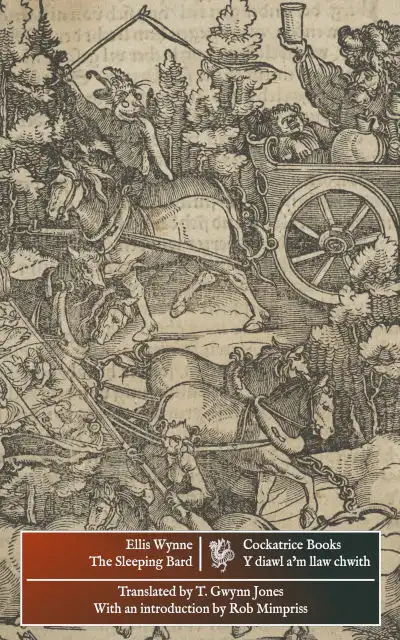Thomas Owen Jones (1875-1941), also known as Gwynfor, was a playwright, actor, producer and broadcaster, and the author of a volume of short stories which reflect the nautical heritage of his native town, Pwllheli, and neighbouring Caernarfon. ‘Yr Onor Bach’ was published in Straeon (1931), and the translation is my own.
‘Britannia! Ahoy!’
‘Hello!’
‘Pick up your bed and walk.’
‘Boys! Get up! On deck at once; that’s the Owner’s voice.’
There was fear in Captain Huws’s voice to see his employer, the Little Owner, standing on shore.
‘What’s the matter?’ he asked.
‘Pick up your bed and walk,’ replied the Little Owner again, and with that he turned and strode away.
The Captain understood the import of the words, and knew well enough that his master’s word was law; therefore there was nothing to be done but obey to the letter the command in the text, and leave port.
That Sunday morning the Little Owner had got up before his usual time, a sign that he was in bad temper, and strode quickly down the Cob and across the Dwnan in the hope of seeing that the Britannia had set sail, and had been disappointed. No doubt his chosen verse, that warned his crew to ‘pack their bags,’ had seemed appropriate on the day. There was no one to rival him in the application of scripture to the affairs of this world: he had a text for every occasion, almost. Among the crew for that journey was his only son, Jac, the very opposite of his father. The owner was thick set, of ruddy complexion, while the boy was tall, wiry and dark-skinned. He took after his mother’s side.
When he heard his father shouting orders from land, he lost his temper and retorted, ‘Take it up yourself, you old fool!’
‘Quiet, Jac,’ said Captain Huws. ‘That’s your father you’re talking to.’
‘My father, aye,’ said Jac, ‘in name only. I’m sick of his nonsense, Captain — he puts on godly airs every Sunday; you won’t get a word out of him all day but a verse or a sermon. But I know all his tricks, and I’m not putting up with them. One of these days I’ll be off — he won’t forgive me; there isn’t a scrap of forgiveness in him, but he can rage all he likes. I’ll take to my heels, well out of sight of him and his ships — I’d have done it a long time ago, if it weren’t for my mother.’
‘Hush, lad. You run down your father too much; you don’t see the good in him. He’s more zealous at chapel than anyone in the district, and I’ve never heard anyone better on his knees, or in the religious meeting, or more skilful in tacking to windward on every subject; there’s a lot of religion—’
‘Religion, indeed. You’ll drive me insane — I suppose you think it’s religion to drive people from their livelihoods on a Sunday morning, for not arranging their lives around his wishes. A pity you didn’t try to weather it out, and let the old Brit take her chances on the rocks. We’d have made it somehow.’
‘Well, that’s what would have happened, Jack, if we’d set sail in this wind.’
He was a kindly, gentle man, Captain Hughes, with nothing on his wrinkled face, grey as the sea, to mark him as a sailor. He knew as many curses and insults as his crew, but was never heard to utter them. Yet that Sunday morning he took his oath under his breath that he would never work for the Little Owner again.
Jac had sailed many times on his father’s ships, and there was no better seaman on the crew, while his free and open manner had made him a favourite among his shipmates.
There was no one more cheerful or eager to please, on land or venturing at sea, but the temptations which assault every generous, liberal nature had begun to take hold of him. Whenever he came home from a voyage, nothing would satisfy him but to go on a drunken spree, like most seamen at that time, and despite his mother’s grief and the pain of his best friends, Jac would fritter his wages away among the idlers of the town, and no one gave him a warmer welcome than those scoundrels who by the end of the week would have taken all he owned. As the years slipped by, Jac went from bad to worse. His father cut him off from his affection, if indeed he had ever been in his affection, but as Jac declined, he sank deeper and deeper into the heart of his mother, and an edge of pain sank deeper also, until her tender heart could no longer bear it, and broke.
After the death of his mother, Jac’s life fell apart, and his father withdrew from him even further, until one day the cord was broken, and Jac was driven out of home, never again to show his face there. He left the port on the first ship that would berth him, and nothing was heard concerning him, nor any mention of his name, except when one old friend would ask another, ‘What’s became of Jac, do you know?’
The years that followed weighed heavily on Mr Evans the Little Owner, bent his back and shortened his step, but without changing his spirit; time left its marks on his body, but divine Grace could do nothing for his soul. One day he received a letter from a port in England, from Captain Hughes, who had heard that a fellow townsman was in prison there, on a charge of manslaughter after a brawl on the street. He had been to see him, and it was Jac. Jac had acknowledged the brawl, but denied the manslaughter, insisting that he had acted in self-defence. He had no lawyer to defend him, and yet had utterly refused Captain Hughes permission to write to his father for help.
Within three days of sending the letter, Captain Hughes received the Owner’s reply, as cutting as the Owner’s injunction to leave port:
‘If a man have a stubborn and rebellious son, which will not obey the voice of his father, or the voice of his mother, and that, when they have chastened him, will not hearken unto them: Then shall his father and his mother lay hold on him, and bring him out unto the elders of his city, and unto the gate of his place; And they shall say unto the elders of his city, This our son is stubborn and rebellious, he will not obey our voice; he is a glutton, and a drunkard. And all the men of his city shall stone him with stones, that he die: so shalt thou put evil away from among you; and all Israel shall hear, and fear. Deuteronomy 21.18-21.’
The captain hired a lawyer, and Jac, being acquitted of the most serious charge, was sentenced to just three years’ imprisonment. A few weeks later, Captain Hughes returned to Porth, but did not attempt to hide Jac’s misfortune, or his father’s callous treatment of him. After that, no one in the town was more despised than the Little Owner. Some said that Providence had begun to turn against him some time ago, and that the tide of his fortunes had turned. He lost his ships one by one, and began to neglect his own person. He seldom left his house, except to go to the chapel. Occasionally, he would drag himself to the quay, and stand for a while leaning on his stick, looking stupidly out to sea as though he expected it to give his ships back to him.
One Sunday the deacons realised that no one had seen him for several days. Two of them called at his house, but no one answered their knock. They went in, and found him sitting at the window, staring out to sea. The Bible was open on the table in front of him, but his eyes were fixed on the sea. The candle had gone out.
He was buried three days later, and almost all his property was sold to pay the costs and to raise a stone on his grave.
Jac served his sentence, and having felt a longing for home during his service, he came home on his release. One day the rumour spread that Jac, the Little Owner’s son, was home. His old friends were overjoyed to see him, and within a few days he had found work on the quay. But soon, the signs of his old weakness came back to him, and he slipped into his old ways again.
One day in winter, one of the Porth fleet was held in the bay by a storm, unable to approach the mouth of the estuary. For a while it struggled against the elements, but to its misfortune the storm strengthened, the ship was unable to continue the struggle, and it was driven into the treacherous shallows. Hundreds set out for the shore, but no one could help, or offer deliverance to the crew. Most of the sailors were from the Porth, and this contributed to the watchers’ concern.
The wind hurled its waves over the ship, burying it from sight; one of its masts was broken, and the crew clung to the rigging of the other, but now one of them dropped down to the deck and ran to the prow, throwing his coat from his shoulders as he leapt into the waves and out of sight. Clearly he was a strong swimmer, for soon he was visible on the crest of a breaker, his face turned to the shore. Soon some of the men on shore were busy knotting a thick rope round someone’s waist, and who was that someone but Jac Evans. Everyone knew that Jac had been a strong swimmer since he was a lad, and that he was afraid of nothing. He stood on the shore while he awaited his moment, and as the wave drew back he hurled himself into the sea and swam out to meet the seaman, and catch him. The two fought the waves, coming closer together, but just as they were about to meet, a huge breaker took them into its maw.
‘It’s over,’ said one. ‘They’re gone.’
‘Pull the rope, and get Jac back to shore,’ said another. They pulled, and Jac was drawn to shore with the seaman in his arms.
It was one of Jac’s old friends, a father of five children. After a long struggle he recovered consciousness and returned home. But not Jac.
A marble column was placed on his grave by admirers, with this inscription:
Here lies
John Evans
A child of the Porth
Who died a hero on 10th December 1862
Greater love hath no man than this, that he lay down his life for his friends.
Nearby was his father’s gravestone. It was made of slate, and was without an inscription.















